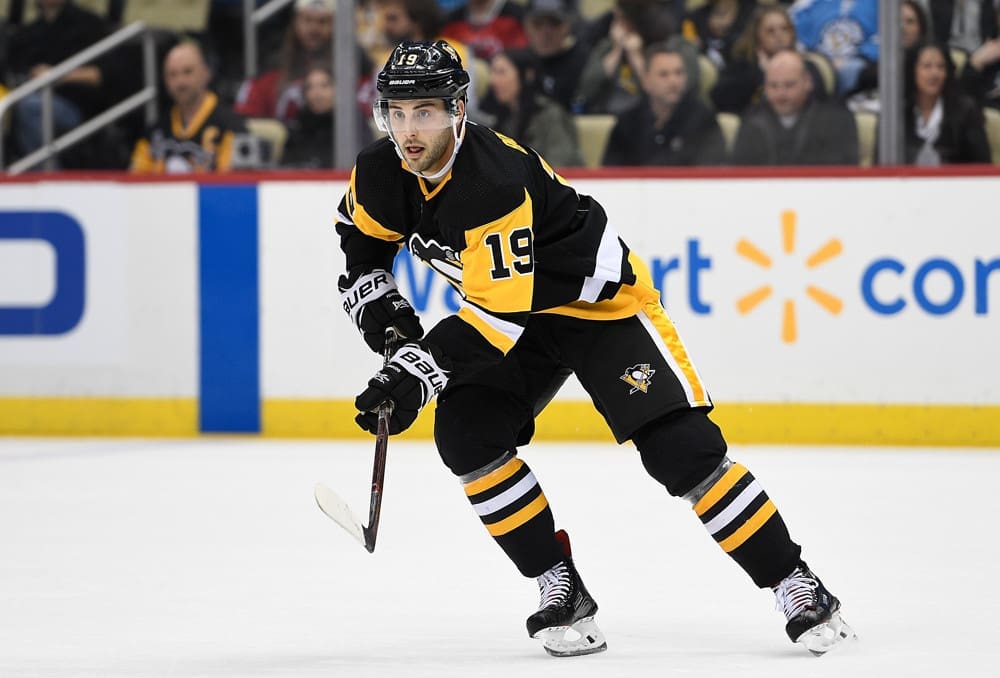Penguins
Derick Brassard’s Struggles With Reduced Role Present Conundrum
Yes, there were frustrations, but seemingly no bad blood for the man sometimes known as ‘Big-Game Brass.’

Derrick Brassard was as open of a book as any at the Penguins’ locker room cleanout Wednesday in Cranberry Township.
Speaking with reporters for over 10 minutes, Brassard dished on seemingly every topic under the sun, short of international relations on the Korean Peninsula and the merits of Childish Gambino’s latest album.
Besides the revelation that his “very difficult injury” — Jim Rutherford‘s description — limited Brassard more than anyone was letting on, the former Senator, Ranger and Blue Jacket also confessed to having a hard time adapting to the reduced role he was assigned in his first couple of months as a Penguin.
“Just the role in general (was difficult), but I was accepting it because we had a good chance to win,” Brassard said. “The 10 or 12 minutes on the ice, I was trying to get the best out of it. The minutes and everything was a little different for me.”
Well, it wasn’t 10 to 12 minutes a night with the Penguins. Brassard got 15:12 per game in the regular season and 13:29 in the playoffs, but that was well down from the 18:21 he was getting in Ottawa and the 16:30 he’s received on average over an 11-year NHL career.
Stack that adjustment with the 180-degree style switch Brassard encountered in his transition from the Senators to the Penguins and it probably didn’t feel much like the same sport from March onward.
“Even in the playoffs, I was making, well, not mistakes, but I was not in the right position or thinking a lot out there,” Brassard admitted.
Another change in Pittsburgh was the caliber of linemates. While Brassard and Conor Sheary joined forces for an outstanding 57-percent shot share in the playoffs, when a player fighting through a nasty second-year slump is your most common partner by far, a meager offensive output (one goal, three assists) in the postseason shouldn’t come as a surprise, injured or not.
On Wednesday, Brassard stood up for Sheary’s game and professed a budding chemistry with the speedy, shifty winger, but it sounds like Brassard wouldn’t mind getting another crack with his fellow member of the skating wounded, Phil Kessel.
“I liked to play with ‘Shears,’ ” Brassard told Pittsburgh Hockey Now. “I like his game and he was on the puck all the time. I had some time with Phil and he scored a couple goals, but in the playoffs he was on a line with (Yevgeni Malkin) or (Riley Sheahan). It was just that something the coach (chose), a decision he made. I go on the ice when he tells me to go.”
If that reads a little passive-aggressive toward Mike Sullivan, it didn’t come off that way in person. In fact, Brassard referenced meetings with Sullivan multiple times, indicating that he was on board with whatever it took to help the Penguins raise the Stanley Cup again. To put it mildly, Brassard knew where he fit on the team hierarchy when he arrived in late February.
“I knew coming in here I was not going to be in the two spot, or the one spot,” Brassard said, giving a verbal nod to Sidney Crosby and Malkin. “I would’ve played like five minutes if I had to. This time of year, it’s not about you, it’s about the team. That’s the first thing I noticed, these guys are tight and a good group of guys.”
For what it’s worth, Sullivan fielded a couple of questions about Brassard and seemed to be regretful that he couldn’t find a way to get more out of player who was probably the highest-profile deadline acquisition in the league.
“When you think in terms of (Brassard’s) whole career, he’s played in a top-two center role,” the coach said, rolling into one of his patented elaborate answers. “When he came to this team he had a completely different role. ‘Brass’ and I have had a number of discussions about this in the time we had him. I knew he was excited, because he’s on a team that has a chance to win. He’s on a team with two generational talents, and so because of that he played a very different role than he’s accustomed to play.
“I think there was a feeling-out or an adjustment process that he went through. I don’t know if we ever got there, to the comfort level where we know he’s capable of being the player he is.”
Here’s the pachyderm in the corner of the room: Could all issues be solved by plugging Brassard into a top-six winger’s role in 2018-19? That way he’d get the additional ice time he’s used to while also increasing the chance he unlocks his full offensive potential.
Sullivan said the Penguins considered placing Brassard on the wing, but didn’t go that route in the playoffs because they felt the center position was “more important,” but I didn’t get the sense it was a foregone conclusion that Brassard would be in the 3C spot for the start of his first Penguins training camp. Brassard noted he was “open” to skating on the flank of Crosby or Malkin.
“Maybe I could play on the wing or the top two lines and I could get a little more ice time,” Brassard said. “I’m sure (Sullivan will) have the plans. He’ll have all summer. We had talks before the playoffs start. He wanted us to have four centers. He felt that no one in the league was stronger than us. I understand that point.”
The biggest takeaway from all this might be that Brassard simply needs more opportunity to be a high-impact player, regardless of which position he plays. Barring some major offseason move, he’s not going to be a part of the top power-play unit and he hasn’t killed penalties in recent years, so his even-strength time will have to increase one way or another.
Brassard said he’s looking forward to a few things this summer. Number one, he won’t have to undergo surgery to repair that pesky lower-body injury, so there should be no obstacle to gearing up for a full season with the Penguins. Number two, he’s aiming to find a house in the area to feel more at home away from the rink. Number three, he’ll have no shortage of championship motivation after getting a taste of this opportunity.
It sounds like Sullivan has given Brassard assurances there will be changes in October.
“Just reenergize, come back for training camp,” Brassard said. “(Sullivan) said it’ll be good to have a good training camp. He said he’s going to find a bigger role for me next year.”
Yes, there were frustrations, but seemingly no bad blood for the man sometimes known as ‘Big-Game Brass.’
“Like I said, I was accepting of my role,” Brassard said. “I’m not standing here bitching about it. I was all in to help win a Cup.”


